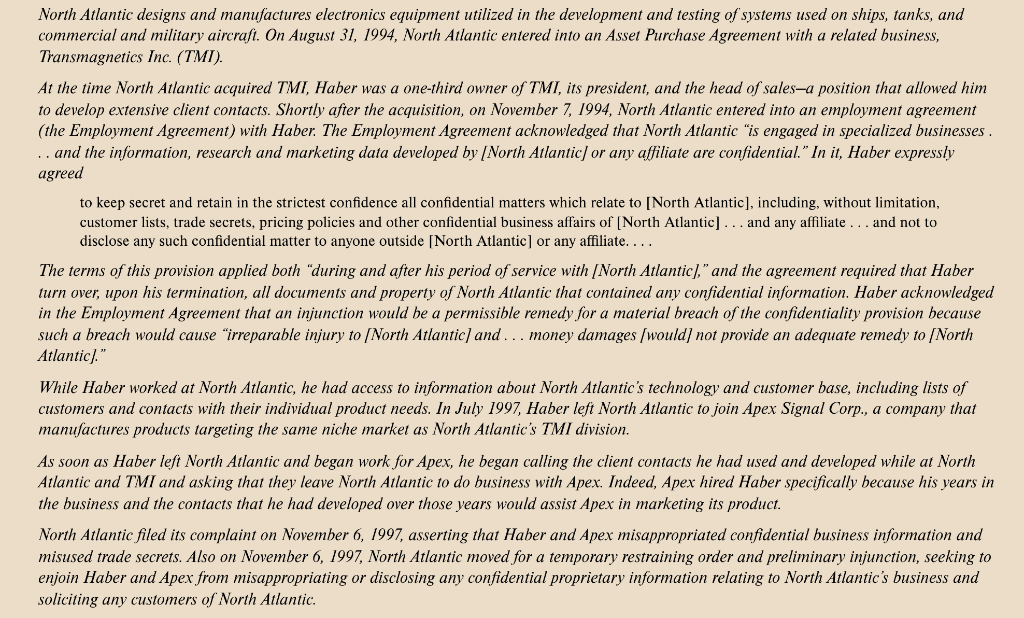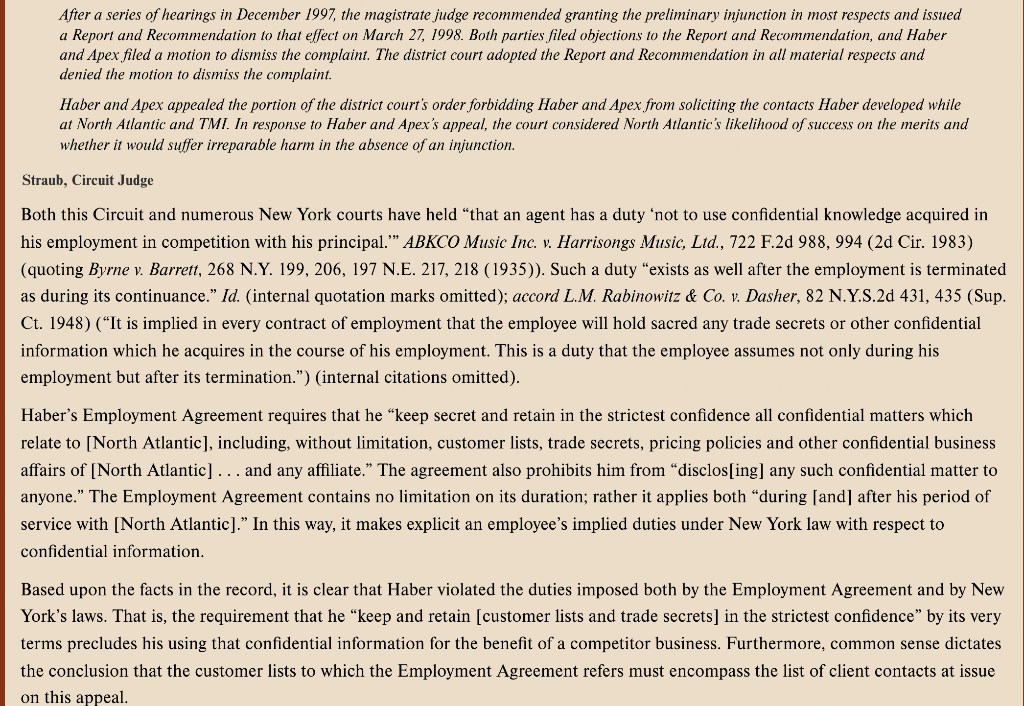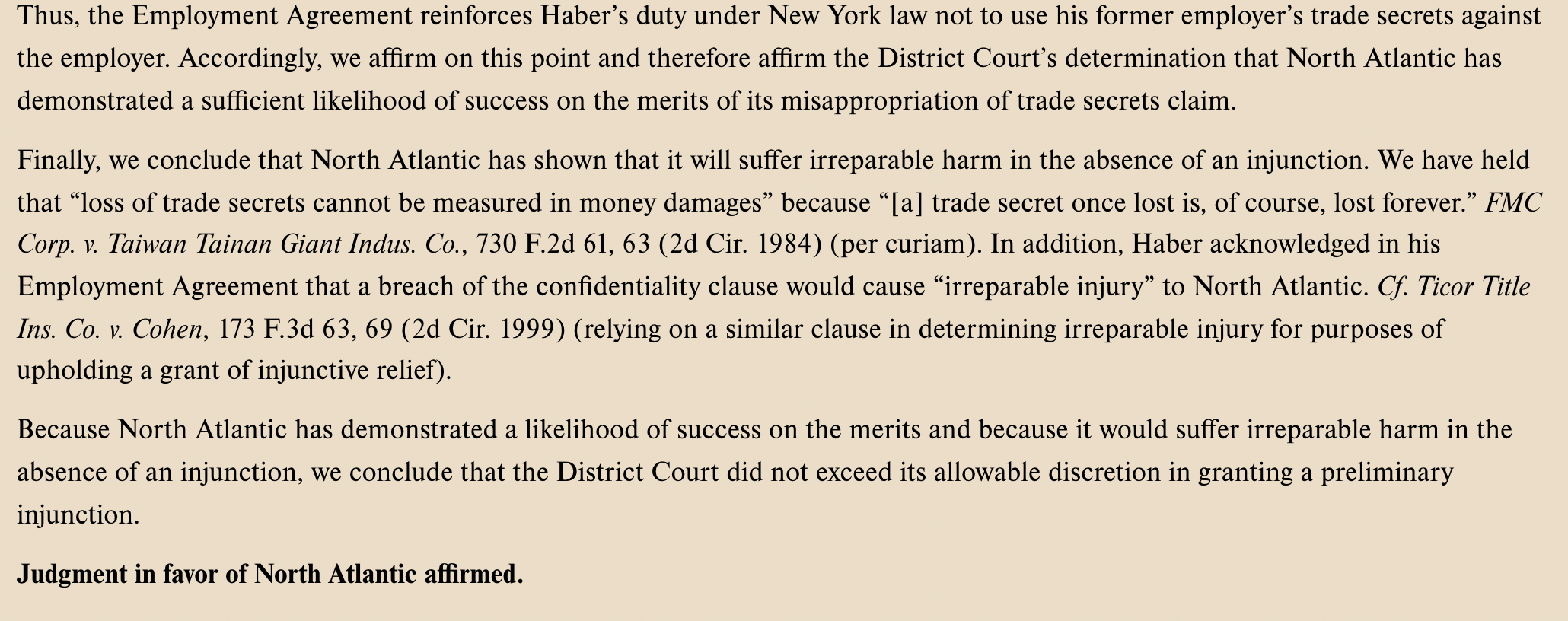Answered step by step
Verified Expert Solution
Question
1 Approved Answer
Please help me Brief this case using the IRAC method North Atlantic Instruments, Inc. v. Haber North Atlantic designs and manufactures electronics equipment utilized in
Please help me Brief this case using the
IRAC method
North Atlantic Instruments, Inc. v. Haber



North Atlantic designs and manufactures electronics equipment utilized in the development and testing of systems used on ships, tanks, and commercial and military aircraft. On August 31, 1994, North Atlantic entered into an Asset Purchase Agreement with a related business, Transmagnetics Inc. (TMI). At the time North Atlantic acquired TMI, Haber was a one-third owner of TMI, its president, and the head of sales-a position that allowed him to develop extensive client contacts. Shortly after the acquisition, on November 7, 1994, North Atlantic entered into an employment agreement (the Employment Agreement) with Haber. The Employment Agreement acknowledged that North Atlantic "is engaged in specialized businesses. .. and the information, research and marketing data developed by (North Atlantic/ or any affiliate are confidential." In it, Haber expressly agreed to keep secret and retain in the strictest confidence all confidential matters which relate to [North Atlantic], including, without limitation, customer lists, trade secrets, pricing policies and other confidential business affairs of [North Atlantic) ... and any affiliate ... and not to disclose any such confidential matter to anyone outside [North Atlantic) or any affiliate.... The terms of this provision applied both during and after his period of service with North Atlantic]," and the agreement required that Haber turn over, upon his termination, all documents and property of North Atlantic that contained any confidential information. Haber acknowledged in the Employment Agreement that an injunction would be a permissible remedy for a material breach of the confidentiality provision because such a breach would cause "irreparable injury to North Atlantic) and ... money damages /would not provide an adequate remedy to North Atlantic)." While Haber worked at North Atlantic, he had access to information about North Atlantic's technology and customer base, including lists of customers and contacts with their individual product needs. In July 1997, Haber left North Atlantic to join Apex Signal Corp., a company that manufactures products targeting the same niche market as North Atlantic's TMI division. As soon as Haber left North Atlantic and began work for he calling the client contacts he had used and developed while at North Atlantic and TMI and asking that they leave North Atlantic to do business with Apex. Indeed, Apex hired Haber specifically because his years in the business and the contacts that he had developed over those years would assist Apex in marketing its product. North Atlantic filed its complaint on November 6, 1997, asserting that Haber and Apex misappropriated confidential business information and misused trade secrets. Also on November 6, 1997, North Atlantic moved for a temporary restraining order and preliminary injunction, seeking to enjoin Haber and Apex from misappropriating or disclosing any confidential proprietary information relating to North Atlantic's business and soliciting any customers of North Atlantic. After a series of hearings in December 1997, the magistrate judge recommended granting the preliminary injunction in most respects and issued a Report and Recommendation to that effect on March 27, 1998. Both parties filed objections to the Report and Recommendation, and Haber and Apex filed a motion to dismiss the complaint. The district court adopted the Report and Recommendation in all material respects and denied the motion to dismiss the complaint. Haber and Apex appealed the portion of the district court's order forbidding Haber and Apex from soliciting the contacts Haber developed while at North Atlantic and TMI. In response to Haber and Apex's appeal, the court considered North Atlantic's likelihood of success on the merits and whether it would suffer irreparable harm in the absence of an injunction. Straub, Circuit Judge Both this Circuit and numerous New York courts have held that an agent has a duty not to use confidential knowledge acquired in his employment in competition with his principal."" ABKCO Music Inc. v. Harrisongs Music, Ltd., 722 F.2d 988, 994 (2d Cir. 1983) (quoting Byrne v. Barrett, 268 N.Y. 199, 206, 197 N.E. 217, 218 (1935)). Such a duty "exists as well after the employment is terminated as during its continuance. Id. (internal quotation marks omitted); accord L.M. Rabinowitz & Co. v. Dasher, 82 N.Y.S.2d 431, 435 (Sup. Ct. 1948) (It is implied in every contract of employment that the employee will hold sacred any trade secrets or other confidential information which he acquires in the course of his employment. This is a duty that the employee assumes not only during his employment but after its termination.") (internal citations omitted). Haber's Employment Agreement requires that he keep secret and retain in the strictest confidence all confidential matters which relate to [North Atlantic], including, without limitation, customer lists, trade secrets, pricing policies and other confidential business affairs of [North Atlantic] ... and any affiliate." The agreement also prohibits him from "disclos[ing] any such confidential matter to anyone." The Employment Agreement contains no limitation on its duration; rather it applies both "during (and) after his period of service with [North Atlantic]. In this way, it makes explicit an employee's implied duties under New York law with respect to confidential information. Based upon the facts in the record, it is clear that Haber violated the duties imposed both by the Employment Agreement and by New York's laws. That is, the requirement that he "keep and retain (customer lists and trade secrets) in the strictest confidence" by its very terms precludes his using that confidential information for the benefit of a competitor business. Furthermore, common sense dictates the conclusion that the customer lists to which the Employment Agreement refers must encompass the list of client contacts at issue on this appeal. Thus, the Employment Agreement reinforces Haber's duty under New York law not to use his former employer's trade secrets against the employer. Accordingly, we affirm on this point and therefore affirm the District Court's determination that North Atlantic has demonstrated a sufficient likelihood of success on the merits of its misappropriation of trade secrets claim. a Finally, we conclude that North Atlantic has shown that it will suffer irreparable harm in the absence of an injunction. We have held that loss of trade secrets cannot be measured in money damages because [a] trade secret once lost is, of course, lost forever. FMC Corp. v. Taiwan Tainan Giant Indus. Co., 730 F.2d 61, 63 (2d Cir. 1984) (per curiam). In addition, Haber acknowledged in his Employment Agreement that a breach of the confidentiality clause would cause irreparable injury to North Atlantic. Cf. Ticor Title Ins. Co. v. Cohen, 173 F.3d 63, 69 (2d Cir. 1999) (relying on a similar clause in determining irreparable injury for purposes of upholding a grant of injunctive relief). a Because North Atlantic has demonstrated a likelihood of success on the merits and because it would suffer irreparable harm in the absence of an injunction, we conclude that the District Court did not exceed its allowable discretion in granting a preliminary injunction. Judgment in favor of North Atlantic affirmed. North Atlantic designs and manufactures electronics equipment utilized in the development and testing of systems used on ships, tanks, and commercial and military aircraft. On August 31, 1994, North Atlantic entered into an Asset Purchase Agreement with a related business, Transmagnetics Inc. (TMI). At the time North Atlantic acquired TMI, Haber was a one-third owner of TMI, its president, and the head of sales-a position that allowed him to develop extensive client contacts. Shortly after the acquisition, on November 7, 1994, North Atlantic entered into an employment agreement (the Employment Agreement) with Haber. The Employment Agreement acknowledged that North Atlantic "is engaged in specialized businesses. .. and the information, research and marketing data developed by (North Atlantic/ or any affiliate are confidential." In it, Haber expressly agreed to keep secret and retain in the strictest confidence all confidential matters which relate to [North Atlantic], including, without limitation, customer lists, trade secrets, pricing policies and other confidential business affairs of [North Atlantic) ... and any affiliate ... and not to disclose any such confidential matter to anyone outside [North Atlantic) or any affiliate.... The terms of this provision applied both during and after his period of service with North Atlantic]," and the agreement required that Haber turn over, upon his termination, all documents and property of North Atlantic that contained any confidential information. Haber acknowledged in the Employment Agreement that an injunction would be a permissible remedy for a material breach of the confidentiality provision because such a breach would cause "irreparable injury to North Atlantic) and ... money damages /would not provide an adequate remedy to North Atlantic)." While Haber worked at North Atlantic, he had access to information about North Atlantic's technology and customer base, including lists of customers and contacts with their individual product needs. In July 1997, Haber left North Atlantic to join Apex Signal Corp., a company that manufactures products targeting the same niche market as North Atlantic's TMI division. As soon as Haber left North Atlantic and began work for he calling the client contacts he had used and developed while at North Atlantic and TMI and asking that they leave North Atlantic to do business with Apex. Indeed, Apex hired Haber specifically because his years in the business and the contacts that he had developed over those years would assist Apex in marketing its product. North Atlantic filed its complaint on November 6, 1997, asserting that Haber and Apex misappropriated confidential business information and misused trade secrets. Also on November 6, 1997, North Atlantic moved for a temporary restraining order and preliminary injunction, seeking to enjoin Haber and Apex from misappropriating or disclosing any confidential proprietary information relating to North Atlantic's business and soliciting any customers of North Atlantic. After a series of hearings in December 1997, the magistrate judge recommended granting the preliminary injunction in most respects and issued a Report and Recommendation to that effect on March 27, 1998. Both parties filed objections to the Report and Recommendation, and Haber and Apex filed a motion to dismiss the complaint. The district court adopted the Report and Recommendation in all material respects and denied the motion to dismiss the complaint. Haber and Apex appealed the portion of the district court's order forbidding Haber and Apex from soliciting the contacts Haber developed while at North Atlantic and TMI. In response to Haber and Apex's appeal, the court considered North Atlantic's likelihood of success on the merits and whether it would suffer irreparable harm in the absence of an injunction. Straub, Circuit Judge Both this Circuit and numerous New York courts have held that an agent has a duty not to use confidential knowledge acquired in his employment in competition with his principal."" ABKCO Music Inc. v. Harrisongs Music, Ltd., 722 F.2d 988, 994 (2d Cir. 1983) (quoting Byrne v. Barrett, 268 N.Y. 199, 206, 197 N.E. 217, 218 (1935)). Such a duty "exists as well after the employment is terminated as during its continuance. Id. (internal quotation marks omitted); accord L.M. Rabinowitz & Co. v. Dasher, 82 N.Y.S.2d 431, 435 (Sup. Ct. 1948) (It is implied in every contract of employment that the employee will hold sacred any trade secrets or other confidential information which he acquires in the course of his employment. This is a duty that the employee assumes not only during his employment but after its termination.") (internal citations omitted). Haber's Employment Agreement requires that he keep secret and retain in the strictest confidence all confidential matters which relate to [North Atlantic], including, without limitation, customer lists, trade secrets, pricing policies and other confidential business affairs of [North Atlantic] ... and any affiliate." The agreement also prohibits him from "disclos[ing] any such confidential matter to anyone." The Employment Agreement contains no limitation on its duration; rather it applies both "during (and) after his period of service with [North Atlantic]. In this way, it makes explicit an employee's implied duties under New York law with respect to confidential information. Based upon the facts in the record, it is clear that Haber violated the duties imposed both by the Employment Agreement and by New York's laws. That is, the requirement that he "keep and retain (customer lists and trade secrets) in the strictest confidence" by its very terms precludes his using that confidential information for the benefit of a competitor business. Furthermore, common sense dictates the conclusion that the customer lists to which the Employment Agreement refers must encompass the list of client contacts at issue on this appeal. Thus, the Employment Agreement reinforces Haber's duty under New York law not to use his former employer's trade secrets against the employer. Accordingly, we affirm on this point and therefore affirm the District Court's determination that North Atlantic has demonstrated a sufficient likelihood of success on the merits of its misappropriation of trade secrets claim. a Finally, we conclude that North Atlantic has shown that it will suffer irreparable harm in the absence of an injunction. We have held that loss of trade secrets cannot be measured in money damages because [a] trade secret once lost is, of course, lost forever. FMC Corp. v. Taiwan Tainan Giant Indus. Co., 730 F.2d 61, 63 (2d Cir. 1984) (per curiam). In addition, Haber acknowledged in his Employment Agreement that a breach of the confidentiality clause would cause irreparable injury to North Atlantic. Cf. Ticor Title Ins. Co. v. Cohen, 173 F.3d 63, 69 (2d Cir. 1999) (relying on a similar clause in determining irreparable injury for purposes of upholding a grant of injunctive relief). a Because North Atlantic has demonstrated a likelihood of success on the merits and because it would suffer irreparable harm in the absence of an injunction, we conclude that the District Court did not exceed its allowable discretion in granting a preliminary injunction. Judgment in favor of North Atlantic affirmed
Step by Step Solution
There are 3 Steps involved in it
Step: 1

Get Instant Access to Expert-Tailored Solutions
See step-by-step solutions with expert insights and AI powered tools for academic success
Step: 2

Step: 3

Ace Your Homework with AI
Get the answers you need in no time with our AI-driven, step-by-step assistance
Get Started


